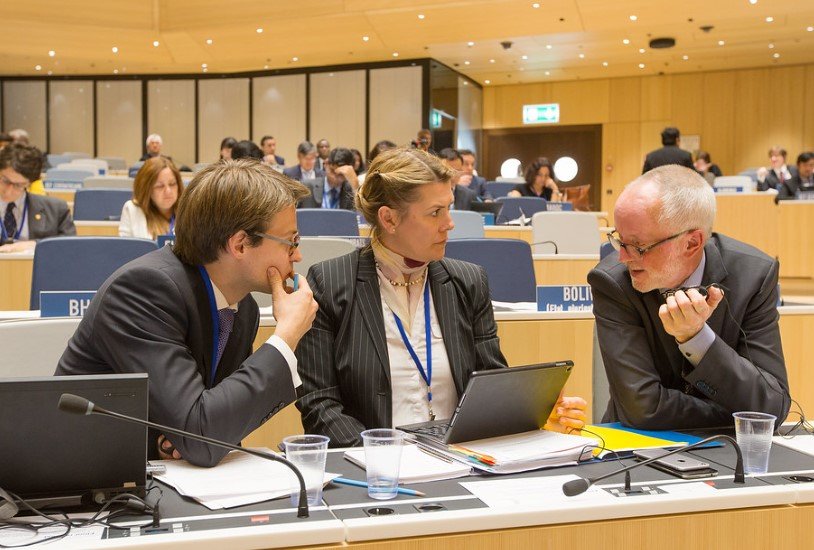South Korea’s Foreign Minister Cho Hyun flew to the United States on Monday to tackle the aftermath of a major immigration raid at a Hyundai-LG battery plant in Georgia. The raid last week led to the detention of 475 workers, including about 300 South Koreans, sparking diplomatic tensions and concerns over foreign investments.
Details of the Georgia Plant Raid
Federal agents from U.S. Immigration and Customs Enforcement carried out the operation on Thursday at the construction site near Savannah. Officials described it as the largest single-site workplace raid in recent history.
The plant, a joint venture between Hyundai Motor and LG Energy Solution, is part of a $4.3 billion project to produce electric vehicle batteries. Production was set to start in October, but the raid halted work and raised questions about visa compliance.
South Korean officials said many detained workers were experts sent for a test run. They might have exceeded their 90-day visa waivers without proper documentation.
Video footage showed workers in handcuffs and ankle chains, which shocked people in South Korea and drew widespread media attention.
Diplomatic Response and Negotiations
Cho Hyun called the situation grave before his departure. He plans to meet U.S. officials in Washington to seek assurances for the workers’ release and future re-entry.

South Korea has arranged a charter flight to bring the detainees home. A deal with U.S. authorities ensures their quick release without charges for most.
This move comes amid broader talks on trade and investment. South Korea has invested heavily in U.S. manufacturing, especially in electric vehicles.
President Donald Trump posted on Truth Social, urging foreign companies to follow U.S. immigration laws. His statement highlighted the need for compliance in such investments.
The raid has caused confusion and a sense of betrayal among South Koreans, who see it as a blow to their alliance with the U.S.
Impact on Business and Investments
The incident rattles major Korean firms like Hyundai and LG. The plant was expected to create thousands of jobs in Georgia.
Experts worry it could chill foreign investments in the U.S. Other companies might hesitate if immigration enforcement disrupts operations.
Here are key economic effects:
- Job creation: The project promised 3,000 positions, now delayed.
- Investment value: Over $4 billion at stake, part of larger U.S.-South Korea deals.
- Market reaction: Hyundai shares dipped slightly after the news.
South Korea’s trade minister expressed concerns about the crackdown affecting ongoing investments. Similar raids have happened before, but this scale is unusual.
Broader Context in U.S. Immigration Policy
Under the current administration, immigration enforcement has ramped up at workplaces. This raid fits a pattern of targeting large sites with foreign workers.
Georgia officials had promoted the plant as a win for local economy. Now, it exposes tensions between economic growth and strict visa rules.
Public sentiment on social media shows mixed views. Some praise the enforcement, while others criticize it for harming international relations.
| Aspect | Details |
|---|---|
| Detained Workers | 475 total, 300 South Koreans |
| Raid Date | September 4, 2025 |
| Plant Location | Ellabell, Georgia |
| Project Cost | $4.3 billion |
| Expected Jobs | 3,000 |
| Production Start | October 2025 (delayed) |
Reactions from Leaders and Public
South Korean President Lee Jae-myung discussed the issue with Trump in a recent call. They aim to strengthen ties despite the hiccup.
In South Korea, media outlets report feelings of betrayal. Many view the U.S. as a key ally, making the raid feel like a setback.
U.S. officials say the action enforces laws fairly, regardless of nationality. They note that most workers will return home without long-term issues.
Analysts link this to upcoming 2026 midterms, where immigration is a hot topic. It might signal tougher stances on foreign labor.
The event echoes past raids on other foreign-funded projects, but the involvement of allies like South Korea adds a diplomatic layer.
What Happens Next
Cho Hyun’s visit could lead to clearer guidelines for foreign workers in U.S. projects. Both sides want to resolve this without damaging economic partnerships.
South Korea plans more investments, like in shipbuilding, worth $150 billion. Protecting these is a priority.
Observers expect updates from the meetings soon. The resolution might set precedents for similar cases.
Share your thoughts on this diplomatic issue in the comments below, and pass this article along to keep the conversation going.
